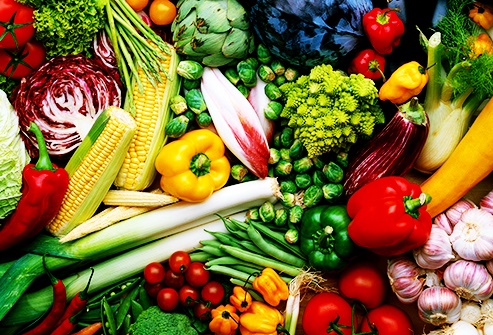[vc_row][vc_column][vc_column_text]Before learning how to become a nutritionist, it’s important to know what a nutritionist does. A nutritionist helps people make better food choices and change their lifestyle to improve their overall health. Nutritionists can also create meal plans, write reports about their patient’s progress, and even speak about their expertise in schools or businesses. Since there is an upward trend of people in the US classified as obese and those diagnosed with cancer and heart disease, nutritionists will see a steady growth in job opportunities in the coming years all across the country.
You can learn how to become a nutritionist and go on to work for hospitals, nursing homes, outpatient medical centers, the government, and private practice. You can earn a bachelor’s degree in clinical nutrition and even use this degree to work towards a RD or RDN credential.
Choosing to be a nutritionist can benefit others as well as help you take care of yourself. Researching the latest data on natural food and exercise regiments can help you become more effective and help a larger group of people change their lives when thinking about how to become a nutritionist. People are looking for more natural solutions to better their overall health to avoid excess prescription medications. While working with the obese and those with chronic conditions is most common, you could also be working with people who have just completed surgery, are pregnant, or have been diagnosed pre-diabetic or pre-hypertension.
Related Article: Ginger Tea
What do Nutritionists Do?


A lot of nutrition is psychological with a vast majority of people suffering from emotional eating. While nutrition is based on matching the best foods for your body type, a lot of what a nutritionist does on a daily basis is encouraging their clients to eat cleanly, maintain a lifestyle that fits their goals, and improves their pre-existing conditions.
A nutritionist can guide you on which diets might work for you and which diets will make your health decline. This is especially helpful for current food trends as they can be difficult to understand the pros and cons. They can also help you test for any food allergies or more severe autoimmune disorders that can cause the body to not work correctly if a certain food is consumed (for example: gluten).
Becoming a nutritionist can be a very rewarding career. Once you learn how to become a nutritionist and complete the training, there are endless opportunities. You can work alongside a full medical staff or be an entrepreneur and make house calls on your own schedule. You can work with kids or adults. You can even work in a corporate setting for food and health-related businesses.
Type 2 Diabetes
Type 2 diabetes is a common condition that you will deal with as a nutritionist. Food intake is a large part of controlling blood sugar each day. As part of a wellness plan, a doctor may recommend their patient seek out a nutritionist or registered dietitian (RD) to help develop a meal plan that will aid in controlling blood sugar.
If you are not on a referral list with doctors in your area, you can also post a listing through the Academy of Nutrition and Dietetics. Their website lists RDs by zip code or expertise. Your insurance provider should also be able to give a list of approved RDs in your area.
A nutritionist takes note of job type (physical or sedentary), food preferences, and eating patterns. Some nutritionists are even certified diabetes educators (CDEs), which after completed training qualifies them as experts in diabetes management. This enables them to create a meal plan that caters to decreasing the side effects of diabetes.
Nutritionists may set a few goals for those struggling with the effects of type 2 diabetes including losing weight loss (if necessary), lowering blood pressure and reducing the cholesterol in the body.
Nutritionists will also ask new patients for a food diary to understand patient’s food preferences and eating frequency. They will also ask for a list of medications, physical activities, and a record of your blood sugar levels.
In exchange, you will provide the patient with a customized eating plan that includes menu options for at home dining and dining out at restaurants. Nutritionists suggest healthy substitutions if patients have bad eating habits and also provide convenient places to find healthy recipes.
Related Article: 5 Best Natural Supplements for Diabetes
Chemotherapy
Cancer can cause your body to break down physically, mentally, emotionally, and even spiritually. Nutrition is crucial for the body to heal before you start chemotherapy, during treatment, and after.
Providing good nutritional advice to a cancer patient can help them accelerate the healing process. Their nutritional needs and appetite can change from the illness and from treatment for the illness. You can help the patient have more energy, help their body tolerate chemotherapy, and decrease the chance of infection by providing a personalized meal plan that can easily be modified through the treatment process.
Often you will be asked to help guide a cancer patient before, during, and after treatment since their tastes and appetite will change throughout the process. The strong drugs that are necessary to fight cancer can cause the body to be more susceptible to environmental toxins as well as common colds. Providing whole foods and nutritious supplements give the body strength and allow it to heal.
How to Become a Nutritionist


Nutrition is also a growing industry that is expected steadily rise as health in America continues to decline. Depending on how much schooling you are willing to go through, once licensed you can work in hospitals, government, schools, or start your own nutrition business.
The Academy of Nutrition and Dietetics (AND) is located in the United States. Even though it is based in the US, it prides itself on diversity and encourages everyone to study nutrition and dietetics including different races, locations, and educational backgrounds. The programs are available in various languages as well.
Associate Degree in Nutrition
When looking at how to become a nutritionist, you can start in the field of dietetics and nutrition with an associate’s degree. An associate’s degree is a good start for anyone who is interested in the field of nutrition. You can decide if nutrition is the path you want to take and work along side a licensed nutritionist for valuable work experience. Although you cannot become licensed with an associate’s degree alone, you can use this degree as a stepping stone to more advanced degrees.
Using your associate’s degree, you can gain employment as a dietician technician. You will be supervised by a licensed registered dietitian or nutritionist.
This program takes two years to complete when you are going to school full-time. You will complete a range of general studies as well as core studies that include classes on sports and community nutrition, weight management, sustainable and cultural foods, and herbal sciences.
If your selected college has an internship program, you will also be able to gain on-the-job training through the school or local businesses.
Bachelor Degree in Nutrition
You can also obtain a bachelor’s degree in nutrition as part of how to become a nutritionist. Along with nutrition, you can also concentrate your bachelor’s degree in food science, dietetics, clinical nutritional care, community nutrition, biology, microbiology, chemistry, biochemistry, anatomy, or psychology.
In the bachelor’s degree program, you will participate in more intense classes regarding the psychology of nutrition. You will gain hands-on training dealing with patients, educating a large group about how to eat properly, and the role that culture and socioeconomics play in today’s nutrition.
A bachelor’s degree in nutrition can be completed in four years from an accredited university. During your undergraduate studies or shortly after receiving your bachelor’s degree, you will also undergo an internship to gain experience in the field. The internship is also required for licensure.
If you are interested in how to become a nutritionist by receiving your RDN (Registered Dietitian Nutritionist) or RD (Registered Dietitian) credentials, you will need to have a bachelor’s degree from an accredited university, complete an internship (with supervision), pass the national exam, and complete continuing education credits.
Masters and Doctoral Degree in Nutrition


With the master’s degree program, you will be able to focus your passion for nutrition by choosing a specialty area. You will also be exposed to classes focused on the importance of nutrition research. Sample classes include epidemiology (global communicable diseases and how to prevent them), eating disorders (how to recognize them and treat properly), and biostatistics (conducting statistical research using public health problems and healthcare issues).
A doctoral degree requires students to pass graduate-level courses in nutrition as well as chemistry and biology. Students will also have to do fieldwork and complete an original dissertation.
If you have already studied nutrition at a master’s degree level and worked in the field, you may be interested in obtaining a doctorate. To obtain a doctorate degree, you must complete a 5-7-year intensive study dedicated to contributing to nutrition through conceiving and conducting studies on nutrition.
You should be interested in teaching about aspects of nutrition in an advanced setting. Finishing a doctorate degree can also help you become an expert in your field and obtain managerial roles in both the public and private companies.
Once you graduate with a doctoral degree, you should have the skills to conduct your own research study on various nutrition topics that are of interest to you, your peers and the general public. This type of study includes gathering evidence-based research and writing about your finding in educational journals.
You will learn about how to treat a patient and how to access their needs based on the information they give you, plus any pre-existing conditions or habits that may affect their health. This can include their patients’ physical health as well as mental health.
Communication is also a focus of a nutrition doctoral degree. Effectively communicating with a patient is crucial for becoming their accountability partner and mentor in regards to their specific dietary needs. You may also need to speak at an event to help people eat properly and maintain a healthy lifestyle. Being able to relate to both children and adult nutritional issues is critical for becoming a successful motivational speaker in your field.
While masters and doctoral degrees are not required to practice nutrition, many will choose to take this course if they are interested in teaching advanced classes on nutrition or become researchers.
Related Article: Green Smoothie Recipe
Education vs. Work Experience
The amount of education a student interested in nutrition pursues is equivalent to the student’s needs and goals. If a student is thinking about how to become a nutritionist and chooses to obtain an associate’s degree and then obtain an entry level job, the student can start to make money right away. Then perhaps they plant to go back to school when they have earned enough money or want to move up the ladder.
If a student chooses to advance their schooling one right after the other, they might not gain as much work experience (especially if they are going to school full-time), but they will gain significant knowledge to enter the workforce at a much higher pay rate.
There is also the option to get a degree in nutrition online. This is a great option of how to become a nutritionist for people that need to work full-time to support themselves or a family. The schedule is usually very flexible and also very enticing for a student that does not physically live near an accredited school where the commute would be impossible.
Nearly half of the states in the US require an individual to be licensed in order to legally perform specific nutrition counseling. Even stricter states require an individual to be licensed as an RD to be a paid nutritionist. However, only one of the highest paying states requires a license (Maryland) to practice. The other highest paying states (California, Oregon, Hawaii, and New Jersey) require a license.
If you are interested in being a nutritionist that takes health insurance as a form of payment, you should take the license seriously as most states only recognize licensed nutritionists to receive health insurance reimbursement for their services.
In order to obtain a license, you will need education from an accredited institution and work experience. While the Academy of Nutrition and Dietetics (AND) regulates RD (Registered Dietician) practices across the country, individual states are allowed to have their own requirements for certifications and licensures in addition to those required by the AND.
Even if your state does not require a license, keep in mind that some employers will give preference to candidates that are licensed, and your salary may be higher if you are licensed too.
Nutritionist Tools
As a nutritionist, you will also be required to use a variety of technological tools to better care for your patients. Specific software is used to compile patient data and form a more comprehensive health plan.
Some of the tools you will use are hydrostatic weighing machines, bioelectric impedance machines, calorimeters, and glucometers.
Hydrostatic weighing machines allow the nutritionist to use underwater weighing to determine body fat to lean mass. It measures a person’s body density and composition using Archimedes’ Principle of displacement.
To get an accurate weight and body fat measurement, the patient is first weighed on a normal scale (dry). Then, a person is weighed in a large tank of water by going underwater and expelling all the air from their lungs. For supreme accuracy, this procure is completed 3 times and averaged.
Bioelectric impedance machines estimate body composition and body fat in relation to lean body mass. Body composition is related to your overall health. BIA (Bioimpedance Analysis) allows for early detection of an improperly balanced body composition, which can lead to heart disease as well as other chronic issues.
Calorimeters are often used to assess the energy expended and can help a nutritionist evaluate the way a particular patient uses nutritional fuel. This is a great test for a patient that is seeking more energy.
Glucometers measure the amount of sugar (glucose) in your blood. This is often used for diabetic patients or for those who might be diagnosed as pre-diabetic.
Nutritionist Skills


Every year, more troubling information is given about man-made toxins that affect our food. Pesticides and other chemicals find their way into our water and food supply. Educating yourself about these toxins and relaying that information to your patients in critical. You should be prepared to talk about how toxins affect the body physically and mentally. You should also be able to answer questions your patients have about organic or GMO foods.
One of the most important qualities of a nutritionist is that they are a good listener. Developing a trusting relationship with your patient is essential for success. If your patient feels comfortable talking with you about their diet concerns and when they have faltered, you can help them achieve their goals and encourage them when they have failed.
However, not every patient will be a good match for you. If you learn to discern when you and your patient are connecting, it will help you understand your patient on a deeper level. Establishing a solid foundation will help you become a better nutritionist and increase the number of referrals you will receive from your existing patients.
If you are having problems connecting with a patient, try to find out what the root cause of the conflict is. Maybe they have already seen a nutritionist and are having a hard time opening up again or their personality just does not mesh with yours. Whatever the case, try to encourage them and help them as best as you can. If the relationship still continues to plateau, consider asking them if they would like to meet with another certified nutritionist. Have a list of trusted nutritionists ready for them if needed.
A good nutritionist will love people just as much as they love a healthy lifestyle. The more you live out what you are teaching your patients, the better your knowledge and passion will be accepted and have a positive impact.
The skills you learn while learning and working as a nutritionist can be profitable financially. Although completed advanced studies and getting licensed will bring you the most salary increase, the entry level jobs pay decently and can be equally as rewarding.
Expected Salary
Salary is always an important component when thinking about how to become a nutritionist. The median salary for a nutritionist in the United States was $58,920 in 2016. However, the salary ranged from less than $36,000 to more than $82,000. The best paying states for nutritionists include California, Maryland, Oregon, Hawaii, and New Jersey. Modesto, California, for example, had a reported average salary of over $92K.
You can expect to earn more money as a nutritionist than a community health worker, but less money than nurse practitioners, registered nurses and physical therapists.
What is the Difference Between Nutritionists and Registered Dieticians?


What is the difference between nutritionists and RDs? Nutritionist is a loose term that is used for a person that helps people lead a healthier lifestyle and reach targeted health goals. Nutritionists are not nationally recognized by a certification or licensure. The weight of the term varies by state.
Registered dieticians (RD) are nationally recognized by certifications and licensure and are legally protected. Specific academic and work experience is required to be a part of the Commission on Dietetic Registration (CDR) and the Academy of Nutrition and Dietetics (AND). All registered dietitians are nutritionists, but not all nutritionists are registered dietitians.
Conclusion
It is not difficult to learn how to become a nutritionist. If you are interested in this field, it is recommended that you be an outgoing person who has an interest in listening and encouraging people to lead healthier lives. You should also be willing to lead a healthy lifestyle yourself. This will establish your expertise and commitment to your profession.
The majority of your class work will involve studies on food, psychology, and ethics. You should have a passion for preparing and eating healthy foods, so you can provide recipes and detailed information on the benefits of certain foods. Researching new and trendy diets can also help you be more relatable to your patients. Depending on their current situation, you can recommend or not recommend that they try a certain diet. You should be prepared to tell your patient why a certain diet is good or bad for them.
As the information on food and environmental toxics is always changing, so should your knowledge on the subject. Reading up to date scientific journals and even contributing to them will help provide your patients with the most up to date knowledge and help them make better choices regarding their food choices.
As a nutritionist, you will handle a diverse case load of patients. Some will need help losing weight, while others will need help managing pre-existing conditions such as heart issues, diabetes, or cancer. Being able to use the specific software, electronic machines, and understanding the results that these tools provide is essential for creating a proper meal plan and documenting your patient’s health assessments.
While you may just have a curiosity to improve your own health or want to teach and research nutrition at an advanced level, there is a path for everyone interested in nutrition. As critical health issues are on the rise, the need for nutritionists will keep you employed for years to come.[/vc_column_text][/vc_column][/vc_row]
